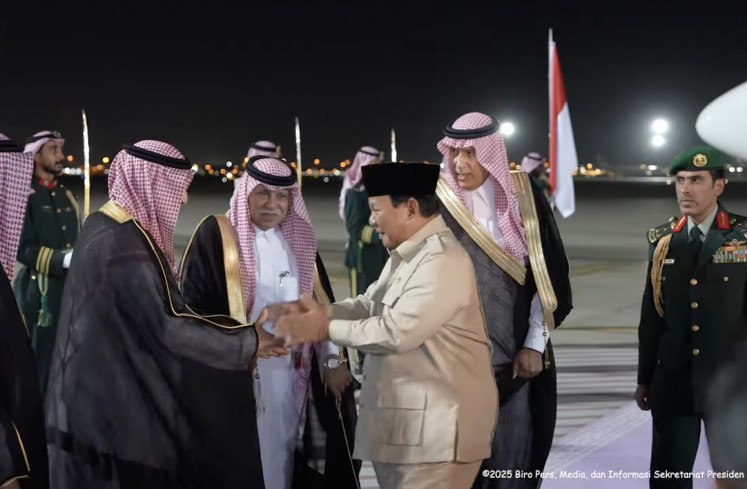Popular Reads
Top Results
Can't find what you're looking for?
View all search resultsPopular Reads
Top Results
Can't find what you're looking for?
View all search resultsPolice cooperation and diplomacy
On Tuesday, Indonesian National Police (Polri) chief Gen
Change text size
Gift Premium Articles
to Anyone

O
n Tuesday, Indonesian National Police (Polri) chief Gen. Sutarman said he was prepared to cut cooperation with Australia if directed by the President. Of course, that is an entirely factual and appropriate statement for the leader of a police force in a democracy.
But his remark has special significance in the context of the current diplomatic concerns and the decades of Indonesian-Australian cooperation that preceded these concerns.
Suspending cooperation between the Polri and Australian Federal Police (AFP) would unnecessarily hurt the interests of both the Indonesian and Australian people. This cooperation should not be used as a diplomatic weapon.
Since the late 1970s in particular, cooperation between Polri and AFP has helped to combat some of the region's most pressing law enforcement problems including transnational crime, drug smuggling, people smuggling and human trafficking, and terrorism.
By working side by side on these issues, Indonesians and Australians have cooperated at times when we needed it most. It's also meant both countries' police have worked together quickly, efficiently and effectively because of the time both invested in each other.
Some instances of that cooperation have been remarkable and should not be forgotten. Based on the systems developed after the Bali bombing of 2002, it now takes only a matter of hours for Indonesian and Australian police to respond to each others' needs in times of crisis. We saw this when it took less than 12 hours to get Australian police beside their Indonesian colleagues after one terrorist attack.
Polri delivered a similarly speedy and important response to an Australian request for help after the 2009 Black Saturday bushfires in Victoria. Australians were grateful for the help of the Indonesian contingent of forensic police, who helped to identify people lost in the fires.
Notably, five of those Polri contingents had worked together with Australian police after the Bali bombings.
Such cooperation is rare and so precious.
Mutual cooperation and respect between Polri and AFP have delivered benefits for each force too. Australian police have given some help to Indonesian colleagues in specialized areas like forensics and high tech crime. Indonesian police have also worked to combat drug smuggling, identify fraud and human trafficking into Australia.
Australia police have gained valuable insights into different criminal activities in Southeast Asia. Cooperation has also extended to fighting illegal foreign fishing in Indonesian waters, for the benefit of those Indonesians who make a living from the sea.
It's also worth noting that Indonesian-Australian cooperation has helped others in Southeast Asia too. The Jakarta Center for Law Enforcement Cooperation ' which enters its 10th year of operation soon ' has seen nearly 14,000 students attend a variety courses on transnational crime, terrorism and law. This centre is a beacon for democratic policing, as well as best practice in these complex anti-crime areas.
This cooperation is not just about the past though. During his visit to Australia last week, Indonesian Vice President Boediono said, 'we must recognize that an important part of the fight against corruption in Indonesia is that our legal system is still weak.'
A more capable police force strengthens other mechanisms of this system, because the ability to investigate complex cases and gather evidence helps to prosecute criminals in Indonesia. This has direct benefits for the rule of law, and so direct benefits for all Indonesians.
The story of cooperation between Indonesia's and Australia's police goes to the heart of a relationship which has grown from strength to strength over the years.
Disrupting years of side-by-side work now would not only hurt the broader diplomatic relationship: it would have serious consequences for both the Indonesian and Australian people.
And these consequences would take time to repair and could prove disastrous in the meantime. A break in cooperation will jeopardise the ability to respond quickly to all kinds of emergencies, be they due to natural or criminal causes.
We hope the President does not make that call to Gen. Sutarman, and that all cooperation between Indonesia and Australia on law enforcement remains as it is. We hope this because the cooperation between Australian and Indonesia is not only about governments ' it is important for both peoples too. Indeed, the only people who would benefit from any disruption to bilateral police cooperation would be criminals that try to harm the Indonesian and Australian peoples.
The writers are analysts at the Australian Strategic-Policy Institute, a non-partisan think tank.









